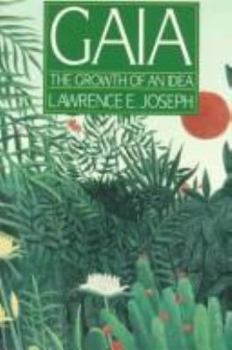Gaia: The Growth of an Idea
Select Format
Select Condition 
Book Overview
Discusses the hypothesis that the Earth's microbes, plants, and animals have coevolved with their environment into one superorganism, and discusses the effect this idea has had on the scientific community.
Format:Paperback
Language:English
ISBN:0312058667
ISBN13:9780312058661
Release Date:January 1991
Publisher:St. Martin's Press
Length:276 Pages
Weight:0.70 lbs.
Dimensions:0.7" x 5.5" x 8.2"
Customer Reviews
2 ratings
A thought-provoking book
Published by Thriftbooks.com User , 18 years ago
I am always a little hesitant about relying on a science book that is 16 years old - so much can change. Apparently, Gaia is still an open issue, and even though there must have been developments since this book, it is still a fascinating look at the beginnings of the issue. Joseph is sympathetic towards the Gaia theory, and obviously an admirer of Lovelock and Margulis, but he approaches the subject with some scepticism, explaining critical points of view and sometimes agreeing that theory is weak at points. Perhaps his attitude is best summed up by his dedication: " ... to James Lovelock, Lynn Margulis and everyone who gives them a good argument". He also mentions controversies that Lovelock has been involved in, such as his failure to support the banning of CFCs. I am somewhat relieved to realize that one of the reasons that I have never been too clear on the exact meaning of the theory is that Lovelock isn't entirely clear and has shifted over the years. I've been doing some study of science history lately, and it strikes me that it is not as important whether or not Gaia is correct if it is fecund. If it gets researchers to look at the relationship of organism and their environment in new ways, to ask questions that they haven't previously thought of, then it will have been valuable, even if it is ultimately disproved. I will admit that a friend who is a geologist was rather distressed at my lackadaisical attitude. Joseph also discusses the spritual aspects of the theory, e.g., how it is used by neo-pagans. He also relates to to historic religions and philosophies. I'm not sure if Lovelock, and particularly Margulis, are grateful for this, but it is interesting. My one complaint about the writing style is Joseph's tendency to use metaphors anthropomorphizing Gaia. This may be fine literary form, but it risks further confusing the reader on this somewhat vexed point. The book includes extensive notes and an index.
Thoughtful, palatable for those not scientically inclined
Published by Thriftbooks.com User , 26 years ago
I preface my review by acknowledging that it has been more than six years since I've read this book and regrettably, no longer have it in my posession. But it so enriched my view of the world, although I harbor only a lay person's curiosity about science, I feel compelled to share my memories of it. In this book, Lawrence Joseph succeeds in revealing, without judgement, how the world of science can be as insular as any other. He explores the processes that eventually bring Lynn Margulies, the macrobiologist, and James Lovelock, the atmospheric scientist, together. Their combined vision of a wholly interactive planet, of cause and effect endlessly mirrored through a timeless looking glass, is resisted by the scientific community. As authors of the Gaia Theory, they struggle with a revolutionary approach to viewing the interaction of the planet from both above and beneath the skin of the earth. For this, they endure the suspicion of other scientists from both disciplines who believe Margulies and Lovelock have sold out to the New Age concept of a holistic universe. The reality of cause and affect, a notion readily accepted as common sense in the most pragmatic of circles, is resisted and often rejected straight out of hand by those with a protectionist view to science. The struggle of Margulies and Lovelock, two creative-thinkers very different in their personalities as well as their areas of interest, provides an element of high drama. And their persistence in developing and expanding the Gaia Theory made for compelling, thought-provoking reading.






